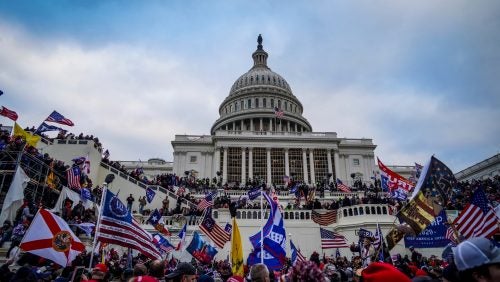Georgetown Law Experts React to Capitol Siege, Other Washington Events
January 13, 2021

In the days since the January 6 attack on the U.S. Capitol, many Georgetown Law professors have shared their expertise on a wide range of relevant topics: the rights, responsibilities and limitations of the various branches of government; the rise of white nationalist militias and other extremist groups; the role of social media and tech companies in the national dialogue; how to interpret constitutional guidance on matters such as presidential pardons or the transfer of power from one administration to the next; law enforcement tactics for bringing a dangerous mob under control and much more.
Here, we share just a sample of recent media appearances by members of our faculty. For more Georgetown Law expertise and commentary, follow our Twitter account.
Professor Rosa Brooks on longstanding dysfunction in the Capitol Police force:
“The failure of the Capitol Police to anticipate, prevent and respond to the violence is… a direct consequence of the way the police agency that protects the legislative branch is organized, with far too little accountability or diversity, jumbled oversight, and too many opportunities for politics to creep into its mission.” [From her opinion piece in The Washington Post]
Visiting Professor Joshua Geltzer on the importance of understanding what led up to the January 6 attack and how to prevent future such incidents:
“If we don’t remember [the events of January 6], if we don’t keep it tattooed on the inside of our eyelids for weeks, and months, to come, we will be making a serious mistake, because we need to learn from it… There could have easily been members of the House and senators hurt or killed by how things played out, and if we don’t appreciate that gravity, and what it means, not just as a failing of securing the Capitol building that needs to happen, but more that there were trendlines in our democracy that pointed to this moment, and that some allowed to get to this moment—if we don’t take that really seriously, then we are not going to figure out a better pathway out of this. [From Slate’s Amicus Podcast]
Visiting Professor Mary McCord, who has long studied the rise of extremist groups:
“it’s not surprising to see these groups showing up. This is something we have seen in the making for some time now. And we have a combination of extremists, far right extremists, including conspiracy theorists, those who buy into debunked, false claims of everything from election fraud to QAnon theories…The online activity of the far-right extremist movement is extremely prolific. And it is, in some cases, encouraging violence, in other cases encouraging overthrow of the government.” [From The PBS NewsHour]
Professor Sheryll Cashin on how this attack, coming the day after Rev. Raphael Warnock became the first Black person elected to the Senate in Georgia, is typical of the cycles of progress and setbacks for Black Americans:
“The emotional whipsaw of Wednesday’s events had another, deeper resonance for Black Americans, whose political history has been defined by the long, tidal rhythms of Black advancement followed by white backlash…In the darkness of this week, we should not lose sight of what the Georgia [Senate election] results reinforced: the power of myriad voters, especially Black ones, to make American democracy work better for everyone.” [From her opinion piece in Politico]
Professor Susan Low Bloch on the presidential pardon power:
“I believe the president can pardon anyone, including him or herself. But the pardon cannot stop an investigation and, in a well-functioning democracy, should provoke an impeachment. The Constitution specifically provides that the pardon power does not prevent — or undo — an impeachment.” [From Vox]
Professor David Super on various mechanisms being explored to remove the president from office:
“Impeachment is the appropriate device for inappropriate presidents, the 25th amendment is for incapacitated presidents. [From Fox 5 DC-TV]
Visiting Professor M. Tia Johnson, on why she believes it would be appropriate to move forward with removing President Trump from office:
“Because of the order of succession in our government, the number two, three and four positions in the order of succession, were all together [at the Capitol]. And so if that insurrectionist, seditionist mob had actually gotten in before Vice President Pence, the speaker, and the majority leader of the Senate had been taken away, they could have decapitated the leadership of this country.” [From Spectrum News]
Visiting Professor Alvaro Bedoya on why the Department of Homeland Security did not prevent the attack on the Capitol:
We’re not going to surveil our way out of a nationwide failure to reckon with white supremacy. That is something that will take years, and that will be much more difficult than running up surveillance budgets for face recognition or any other surveillance program…
The great bait and switch of the national security state is that we were promised an agency to combat terrorism, [and] we were given an agency that prosecutes immigrants and that persecutes immigrants.” [From American Public Media’s “Marketplace”]